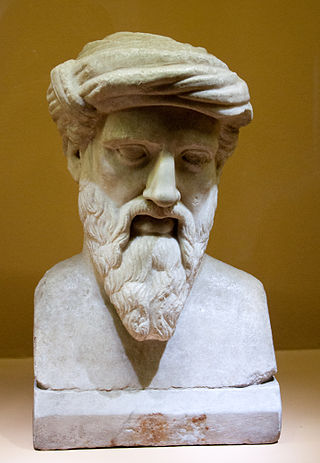Pythagoras
Greek philosopher and mathematician (c. 570 – c. 495 BC) From Wikipedia, the free encyclopedia
Remove ads
Pythagoras of Samos was a famous Greek mathematician and philosopher (c. 569 – c. 475 BC).[2][3]


He is best known for the proof of an important Pythagorean theorem, This is about right angle triangles.
He started a group of followers called the Pythagoreans, who lived like monks.[2][3]
Remove ads
Life and travels
Pythagoras was born in Samos, a little island off the western coast of Asia Minor. Pythagoras traveled to many places, including Miletus, Egypt, Babylon, and southern Italy. Southern Italy was where he founded the Pythagorean school, in the town of Croton.[2][3]
Impact
Pythagoras had a great impact on mathematics and theory of music. His theories are still used in mathematics today. Since he worked very closely with his group, the Pythagoreans, it is sometimes hard to tell his works from those of his followers.[2][3]
Religion was important to the Pythagoreans. They believed the soul is immortal and goes through a cycle of rebirths[3] until it becomes pure.[2]
Remove ads
His beliefs
Pythagoras' most important beliefs were that:
- At its deepest level, reality is mathematical in nature,
- Philosophy can be used for spiritual purification,
- The soul can rise to union with the divine,
- Certain symbols have a mystical significance, and
- All brothers and sisters of the order should observe strict loyalty and secrecy.[2]
Pythagorean theorem

Pythagoras is most famous for his theorem about right triangles. He said that the length of the longest side of the right angled triangle (called the hypotenuse) squared would equal the sum of the other two sides squared: a² + b² = c². There are many different proofs for this Pythagorean theorem.[3] In the pythagoras theorem c is the hypotenuse and a&b are the legs of the right triangle.
Remove ads
Sources
- Joost-Gaugier, Christiane L. (2006), Measuring Heaven: Pythagoras and his Influence on Thought and Art in Antiquity and the Middle Ages, Ithaca, New York: Cornell University Press, ISBN 978-0-8014-7409-5
- Cerqueiro, Daniel. “Evohé (Doxografía de Pitágoras)”. Buenos Aires 2004: Ed. Peq. Ven. ISBN 987-9239-14-8
References
Other websites
Wikiwand - on
Seamless Wikipedia browsing. On steroids.
Remove ads

